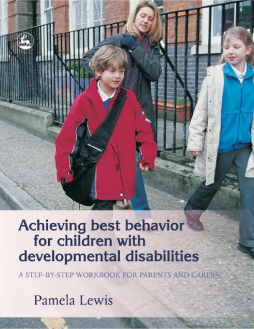
Additional Information
Book Details
Abstract
Achieving good behavior and social skills in a child with developmental disabilities can often be very difficult, and methods that improve behavior in other children are often unsuitable or ineffective. Achieving Best Behavior for Children with Developmental Disabilities is an accessible workbook designed specifically for parents of children with developmental disabilities.
It offers practical, hands-on advice and step-by-step instructions for drawing up and implementing behavior plans that successfully address and improve challenging behaviors. The book is also full of interactive checklists and activities that help to monitor and assess behaviors and track a child's development. The author also explains the reasons for children's behaviors and gives a wealth of practical advice on how to deal with specific situations, from shopping trips and getting a haircut to dentist appointments and children's birthday parties.
Primarily for parents and carers of children with developmental disabilities, this book will also be of use to teachers, school psychologists, occupational therapists, speech/language therapists, social workers and anyone working with children with developmental disabilities.
This book is well laid out and would be easy to dip in and out of when wanting to find specific information.
Occupational Therapy Journal
This interactive workbook aims to help parents of children with developmental disabilities develop their parenting skills. However, anybody living and/or working with this group of children would benefit from the contents of this book. Parenting children with developmental disabilities can sometimes be a bit daunting, and this book sets out some "basic principles" of managing behaviour and shows readers how to put them into practice.
YouthInMind.net
This book is written for parents of children with developmental disabilities, but could be used by all sorts of professionals, such as childminders, pre-school staff, social workers and therapists. It would be an ideal resource for parents and carers to use when preparing a plan together for consistency of care.
It's written in a friendly style, with no technical jargon, but clear explanations and examples of different types of behaviour and ways to deal with it. It is written with a very clear emphasis on being positive with your child. There is also a section on finding support as a parent or carer, which is often overlooked but vitally important. It is packed with interactive checklists for parents and carers, activities to do with the children, and lots of strategies to help everyone cope with day-to-day life. I would recommend this excellent book and I give it a score of 10/10.
The National Childminding Organisation
This short book, Achieving the Best Behavior for Children with Developmental Disabilities: A Step-by-Step Workbook for Parents and Carers, covers a wealth of information. The focus is practical, individualized and proactive. The tone is appropriately gentle and supportive. It is clear and directive without either using jargon or belittling the audience by being simplistic. The workbook format is very well-paced and user-friendly, consisting of brief explanatory text followed by thorough, hands-on structured questionnaires. The progression of ideas is logical and simple to follow, without overwhelming the reader. Different bases are covered very systemically and thoroughly, from ruling out medical problems to identifying community supports. References are provided when a more in-depth explanation would be beyond the scope of the book (e.g., regarding problems with sleeping).
APA Review of Books
Pamela Lewis is a psychologist based at the Clinical Services Unit, Waisman Center, University of Wisconsin-Madison, USA.
It would be an ideal resource for therapists working with parents/carers who want to break down the process and to encourage their active participation.
Occupational Therapy Journal
Pamela Lewis clearly has huge experience of working with parents and is sensitive to the issues facing them. The main thrust of the book is on understanding the child but at the same time recognizing that parents can feel very isolated when their child behaves very differently from their peers and does not respond to the usual sanctions of everyday life.
I would recommend this book to those supporting parents and to parents and carers of children with complex disabilities. It is a book that is bout understanding, sharing and support. Most of all the book offers possible options for families that could become solutions.
Educational Review
Table of Contents
| Section Title | Page | Action | Price |
|---|---|---|---|
| Acknowledgements | |||
| Preface | |||
| Chapter 1 The environment | |||
| Chapter 2 Gender and development | |||
| Chapter 3 Racism | |||
| Chapter 4 Culture | |||
| Chapter 5 Transforming governance | |||
| Bibliography |
